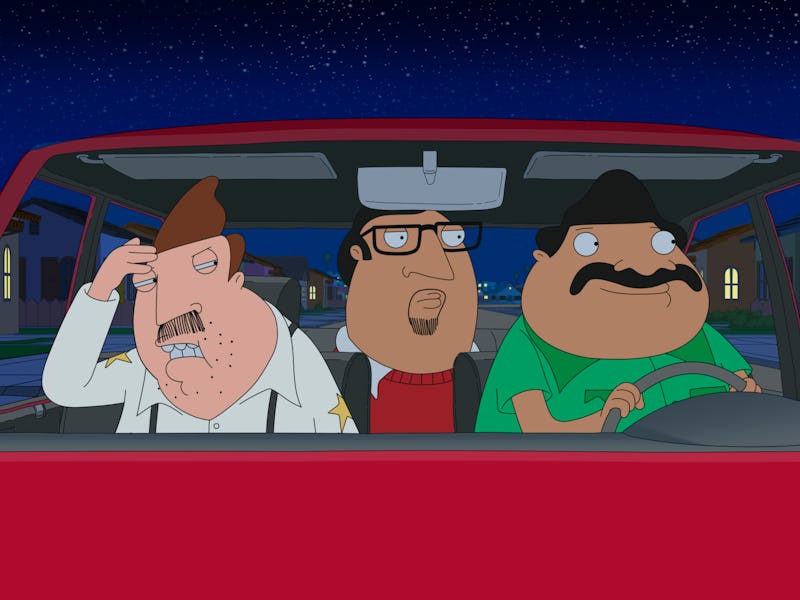Here's What's Up With Seth MacFarlane's New Series 'Bordertown'
The Mexifornia-set immigration sitcom premieres soon.

Seth MacFarlane’s stardom has exceeded the silver screen. The producer/actor/singer has moved on from his star-making animated sitcoms Family Guy and American Dad for the greener pastures of Ted, ruining the Oscars three years ago, and, of course, Ted 2: It Gets Teddier. Now, MacFarlane has found his way back to Fox as the executive producer for Family Guy writer Mark Hentemann’s new series Bordertown.
Set in the fictional Mexifornia, it stars The Simpsons legend Hank Azaria as Bud Buckwald, a red-blooded border officer who, for lack of a better phrase, wants to Make America Great Again. With a politically charged topic and the willingness to stereotype on both sides of the literal and ideological borders (i.e., American and Mexican, as well as liberal and conservative), Bordertown, at first glance, seems like quite a promising return for MacFarlane.
In practice, however, Bordertown does not live up to the expectations of such a provocative show. Most surprisingly, it’s not the politics either that weigh it down. Bordertown is truly apolitical, even when directly talking about political issues — a commendable effort from Hentemann. In fact, patron saint of snide Bill Maher is even mocked repeatedly. Nevertheless, simply remaining relatively unbiased is not enough to mark the sitcom as a cultural force for good.
Despite its exterior, Bordertown is quite conventional. Bud is an everyman who’s jealous of his more successful — and, in this case, Mexican immigrant — neighbor Ernesto Gonzalez. The trope should really be familiar to most TV watchers. The first episode, “The Engagement,” centers around Bud’s disapproval of his daughter, Becky, marrying Ernesto’s college-educated son J.C. In the end, Bud begrudgingly sees why his daughter may love — gasps — the American son of Mexican immigrants.
Ultimately, though, nobody watched Family Guy for its stories, even when it was at its best. Although MacFarlane’s signature show has not aged particularly well, its cutaway humor has become iconic. American Dad toned down that particular brand of absurdity and focused on plot and character development. Now, Bordertown is returning to the MacFarlane Special, but with more slapstick tweaks. For example, Bud’s head explodes upon hearing of his daughter’s engagement, which he then acknowledges to a coworker was a joke, in a half-hearted attempt at meta humor. It’s not quite Chester Cheetah doing a line of Cheetos blow, but the roots — namely, that it’s a total non-sequitur — are there.
Beyond physical humor, Bordertown’s other new cutaway technique is through asides. For instance, Becky and J.C. talk about gluten-free this or feminism that because they’re the kooky liberals! (Again, for better or worse, nobody is free from ridicule on this show.) Meanwhile, Bud sits and agrees with the screaming conservative TV pundits, blissfully blind to his own self-contradictions.
Not all of the comedic efforts are heavy-handed failures. One of the bright spots is Bud’s five-year-old beauty pageant daughter Gert. She’s obviously just a Honey Boo Boo spoof, but that does not detract from how naturally the jokes flow into her character. She’s possibly the most self-aware character (maybe following in the footsteps of Family Guy’s own genius baby Stewie Griffin), and gleefully performs (and eats out of a trough with) her pet pig.
In addition to Gert, Bud’s wife Janice has plenty of wit. She makes several off-handed remarks about cheating on Bud with various Spaniards and/or Mexicans, something that would obviously hurt him on several levels. Gert and Janice are not quite as hapless as Bud and not naïvely optimistic like Becky. If Bordertown is going to succeed as more than just a premise — because it could very easily be rendered just A Show About A Thing — the supporting characters will have to do some comedic heavy lifting.
Bordertown certainly has the potential for posterity. Hank Azaria has a good track record as a voice actor — even if Bud sounds a little too much like Comic Book Guy — which means vocal tricks alone could serve as fodder for funny sequences. And while Seth MacFarlane may have a knack for rubbing people the wrong way, he usually does so in a way that tickles the funny bone, as well.
Bordertown should be no different. The show cannot rely on stereotype alone as an end — which it does quite heavily early on — but should use it as a means for furthering stronger ideas. It does not need to be a political savior nor a complex critical darling. But at the very least, Bordertown has the potential to be quite funny, if it uses its strengths wisely.